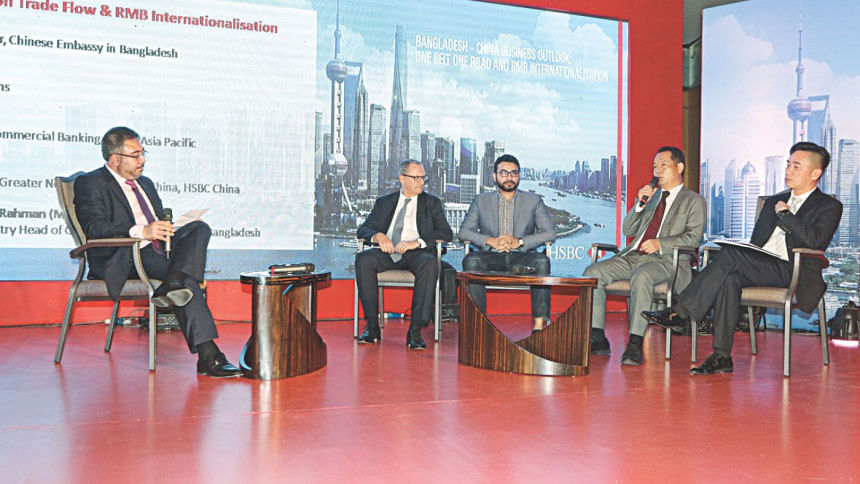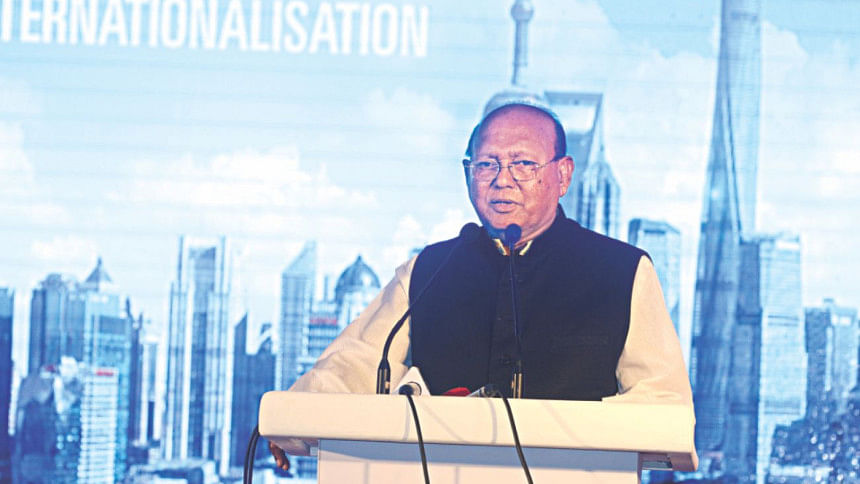Trade in yuan to reduce costs of doing business: analysts

Bangladesh's exporters and importers should embrace the Chinese currency renminbi (RMB) for trade settlement with China, as it will be cost effective for the local businesses, experts said.
“The renminbi is the third most used currency in international trade settlement,” said Stuart G Tait, head of commercial banking of HSBC Asia-Pacific.
“The use of the renminbi is only going to increase, and 50 percent of all Chinese trade would be settled in the currency within three to five years,” he said at a meeting at Westin Dhaka on Wednesday.

Ma Ming Qiang, Chinese ambassador to Bangladesh, said the local garment importers buy machinery from China and export the finished products. “If these export and import payments are made in the RMB, you will save a lot – up to 6 percent.”
“So I would request HSBC and other banks to do it. And I am trying very hard to get one Chinese bank in Dhaka.”
“If we can settle our trade in the RMB, it would bring enormous benefits to the local traders,” he said.
In 2015, 30 percent of trade between China and its partners was settled in the RMB, said Alvin CK Kong, managing director and head of global markets of HSBC Malaysia.
He said China is a major trading partner for most countries in the world. “So, it does not make sense for China to be using some other currency for trade settlement.”
The Hongkong and Shanghai Banking Corporation Ltd (HSBC) organised the event titled 'Bangladesh-China Business Outlook: One Belt One Road and RMB Internationalisation'.
The discussion, organised in association with the China Chamber of Commerce in Bangladesh, aimed to enhance customer understanding on the Belt and Road Initiative (BRI), explore export possibilities from Bangladesh to China and promote RMB transactions, as the currency will be used more widely, aided by reforms for further internationalisation.
China is the largest trade partner of Bangladesh. In 2015-2016, bilateral trade exceeded $10 billion, where imports from China stood at around $9.5 billion. Bangladesh is China's third largest trade partner in South Asia, according to HSBC Bangladesh CEO Francois de Maricourt.
In his address, Commerce Minister Tofail Ahmed said the country's trade gap with China and India would remain because the imports benefit Bangladesh.

The government is setting up 100 special economic zones to attract more foreign investors, he added.
According to HSBC, the largest foreign bank in China, the RMB will continue to gain international importance as China's capital markets open up, cross-border trade and transactions increase, and more of China's overseas direct investment is conducted in the currency.
In October last year, the International Monetary Fund included the RMB in the special drawing rights basket as the fifth currency. It is often regarded as a 'basket of national currencies' comprising five major currencies of the world.
At the time, the IMF said RMB's inclusion reflects the progress made in reforming China's monetary, foreign exchange, and financial systems, and acknowledges the advances made in liberalising and improving the infrastructure of its financial markets.
Chinese Ambassador Qiang said Bangladeshi manufacturers should produce goods and items that have demand in China.
“For example, Bangladesh's mango is the most expensive in China,” he said, adding that leather products exports to China went up by 38 percent.
China imports goods and services worth $4 trillion annually. “If Bangladesh can capture 1 percent of the market, it would amount to $40 billion, which will be huge,” said Qiang. “Bangladesh has cheap labour. So, you have the potential to occupy 1 percent or even 5 percent.”
Speaking at a panel discussion, Lin Wei Qiang, president of the China Chamber of Commerce in Bangladesh, said many Chinese companies already have a presence in Bangladesh, and a growing number of investors want to invest.
There are many investors who think on long-term basis, he said. The next generation of existing investors is also entering the market and they should be given more privileges, he added.
He said getting legal services and corruption are the two main barriers standing in the way of foreign investment in Bangladesh.
Kazi M Aminul Islam, executive chairman of the Bangladesh Investment Development Authority (BIDA), said the authority has proposed reforms aimed at facilitating businesses. “We hope the one-stop service bill will be enacted in the next parliamentary session.”
Shitangshu Kumar Sur Chowdhury, deputy governor of Bangladesh Bank, said the RMB's inclusion is an important milestone in the integration of the Chinese economy into the global financial system.
Laura Galvin, managing director of Asia head of export finance of HSBC, said the bank's presence along the BRI routes means it is well positioned to assist customers with trade, investment, project-financing and other needs.
Kong of HSBC Malaysia presented a keynote on the BRI. The BRI aims to facilitate unimpeded flow of trade, stimulate investment, remove barriers and lower cost, he said.
The initiative would require $8 trillion in investment, he added.
The Asian Infrastructure Investment Bank, the Silk Road Fund and some large Chinese banks would come up with funds, but there would still be an investment deficit of $5 trillion.
Li Guang Jun, economic counsellor of the Chinese embassy in Bangladesh, said jute and jute products, seafood and garment products are exported from Bangladesh to China.
“We are encouraging Chinese businesses to invest in Bangladesh,” he said, calling on Bangladeshi manufacturers to diversify their export basket.
Syed M Tanvir, director of Pacific Jeans, an exporter to China, said customs clearance and documentation take 10 to 15 days in China but exporters cannot afford this lengthy period in an era of fast fashion.
Ernest Li, head of corporate, Greater Northern & Central China, HSBC, said the BRI and the internationalisation of the RMB would go hand in hand.
Tait of HSBC Asia-Pacific said the BRI is a prime example of how China is reaching out and increasingly integrating its economy with the rest of the world. “It is a driving force of trade facilitation and liberalisation in the world at a time when protectionist pressures are rising elsewhere.”
He said much more of the growth in the world is going to come along the business corridors that connect markets within this region, as well as those that connect Asia to the rest of the world.
Tait said developing physical infrastructure and robust trade relationships means Asia and economies such as Bangladesh will be ideally positioned to sit at the centre of global value chains.
HSBC is the largest foreign bank in China and has consistently been at the cutting edge of the RMB internationalisation process, offering its clients early access to new opportunities as they emerge, said Md Mahbub Ur Rahman, HSBC Bangladesh's deputy CEO and country head of commercial banking.

 For all latest news, follow The Daily Star's Google News channel.
For all latest news, follow The Daily Star's Google News channel. 



Comments